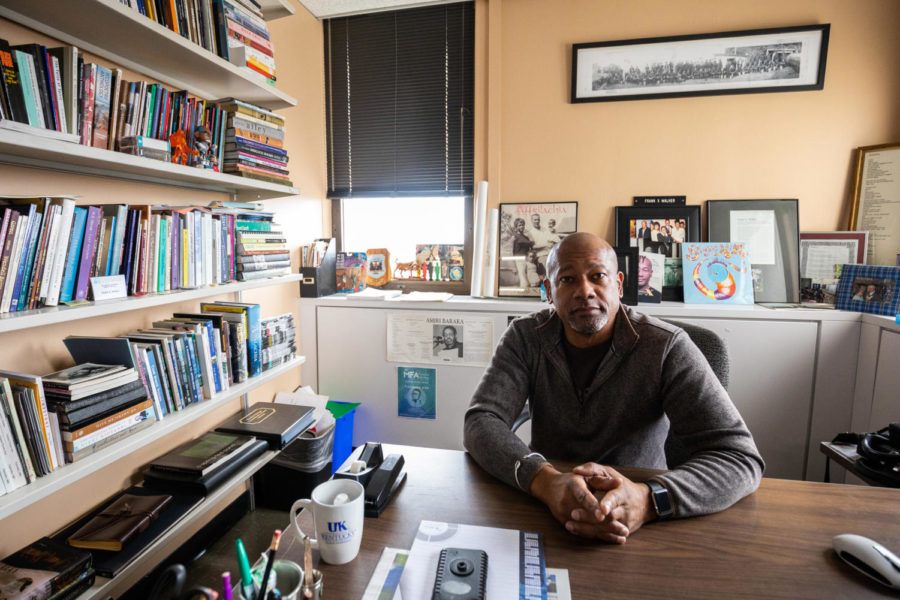Isaac Murphy: Brought to life by Frank X Walker
University of Kentucky English professor Frank X Walker poses for a portrait in his office on Saturday, Feb. 8, 2020, at the Patterson Office Tower in Lexington, Kentucky. Photo by Michael Clubb | Kentucky Kernel
March 1, 2023
On Feb. 11, I had the honor of going to see my first performance at the Lyric Theatre here in Lexington. Long known as a cultural hub since the 1950s, the Lyric Theatre has been a home for African American artists and actors.
Walking through the theater, its age was apparent as well as the legacy it has left on the community, with posters and memorabilia dedicated to past performances and programs decorating the walls.
The smell of popcorn and the small talk of those in line at concessions filled the air.
The environment in the theater was warm and vibrant, and it bustled with noise and chatter. I was in attendance with my boyfriend, and we both managed to get seats in the center first row, courtesy of my mother of course.
Before the play began, a member of the theater graced the stage and gave a few announcements. One really caught my attention: the playwright, Frank X Walker, was in the house.
Since I was sitting in the front row, I got too nervous to turn around and track my eyes amongst the crowd in search of Walker himself. I got the chance to talk with Walker back in 2021 in an episode for the KRNL Talks lifestyle podcast, and it was an insightful conversation.
It left me with more questions than answers on Walker’s continuous journey in creating literary and creative works, especially since his works uplift those in the African American community and get both those in the African American community and outside to reconnect with our country’s history.
This is seen in Walker’s most recent work, “A is for Affrilachia.” This is his first children’s book, and it depicts the contributions of African Americans in Appalachia.
Walker has clearly dedicated a large part of his life to storytelling in different mediums.
Walker’s book, “Isaac Murphy: I Dedicate this Ride,” was published in 2010. It shows Murphy’s life through persona poems.
Having not read it, the play adaptation of it made me want to go out and buy the book to digest Murphy’s stories and Walker’s persona poems of his story more whole.
In a short documentary presented by Kentucky Educational Television in 2013, Walker said the idea for the play came at the request of Larry Snipes, a former director of the Lexington Children’s Theatre.
He wanted children to learn more about Kentucky’s equestrian world but in a nontraditional way from a new perspective.
The acting in the play was great, and some of the scenes brought me to tears, specifically the scene where Murphy’s mother sings and at the end where we learn how much Murphy suffered to achieve such success in horse racing.
The play left me somber and questioning the impact of African Americans in Lexington during the time after the Civil War. It seems like African Americans were present in all professions, including horse racing, and were gradually pushed out of the sport overtime.
Murphy was just one of a few successful Black jockeys. He won the Kentucky Derby three times, the Latonia Derby five times and four times at the American Derby.
In 1896, he died of pneumonia at age 36. His remains were buried in one of Lexington’s African American cemeteries until 1967, when he was exhumed and reburied next to legendary racehorse Man o’War. In 1978, they were both reburied at the Kentucky Horse Park.
In the play, it was emphasized how this move left Murphy’s wife, Lucy, behind and buried without her husband.
It is important to learn about the impact of all Kentuckians in this state’s history, including the impact of those from Black and brown communities. Our history is here but only beginning to be talked about and shared.
I encourage everyone to learn more about Isaac Murphy and other Black figures hidden in the legacy of Lexington, Kentucky.
































































































































































